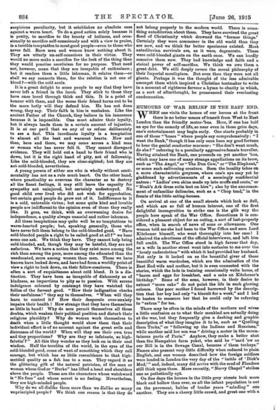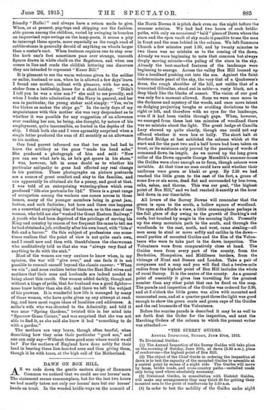HTIMOIIRS OF WAIL RELIEF IN THE EAST END.
WHEN one visits the homes of our heroes at the front there is no better means of transit from West to East London than the friendly motor-'bus. Here, if one has half an eye for the comedy of life, so near even in these grim daps, one's entertainment may begin early. One starts probably in one of those "'buses" where people say comprehensively : "I want the Bank," though it has only once been my good fortune to hear the genial conductor murmur, "She don't want much, do she P " referring to a peculiarly aggressive female traveller. Having attained the Bank, one proceeds on yet another 'bus, which may have one of many strange appellations on its brow, such as "The Angel," or" The Dun Cow," or" The Elephant," or acme such enlivening creature. Soon the locality takes on a more characteristic greyness, where one's eye may yet be gladdened by advertisements of a seemingly confidential nature: "Ladies' own skins made up into muffs and coats," or "Noah's Ark dress suits lent on hire"; also by the announce- ment of unfamiliar delicacies, such as a "Chop toad," in the fronts of the little eating-houses.
On arrival at one of the small streets which look so dull, and which are so full of human interest, one of the first delightful incongruities to strike one in the glib way the people here speak of the War Office. Sometimes it is con- sidered a pleasant object for an outing, a sort of lost-property office, when in search of news of sons or allowances. One woman told me she had been to the War Office and seen Lord Kitchener himself, who went thoroughly into her ease! I admired the adroitness of the official interviewer, and left him full credit The War Office stood in high favour that day, as a wife in another street went into ecstasies to me over the "lovely underclothes "with which it had provided her husband. Not only is it looked on as the bountiful giver of these beautiful warm wardrobes, which are the admiration of the East End wife sad mother, but it is even connected with the stories, which the lads in training occasionally write home, of "bacon and eggs for breakfast, and a cake on Kitchener's birthday." Some of the sons, however, in their desire to extract "more cake" do not paint the life in such glowing colours. One poor mother I found harrowed by the descrip- tion that her boy had only "a biscuit for a week," and I had to hasten to reassure her that he could only be referring to "extras " for tea.
There may be often in the minds of the mothers and wives a little confusion as to what their menkind are actually doing at the war, but they frequently give a dashing and graphic description of what they imagine it to be, such as "Quelling them Turks," or "following up the Indians and Russians," while another said her son was " driving a motor in the moun- tainous parts of Paris." Anyhow, they make a better shot than the Hampshire farm yokel, who said he "card 'ow as our Bill is in the Sewage Canal, because o' them turkeys." Names also present very little difficulty when reduced to plain English, and one woman described how the foreign soldiers were landed in London the very day of the "battle of 'Dick's Mud," and, indeed, many did waive with the mud of Flanders still thick upon them. More recently, "Nervy Chapel"strikes one as pathetically apt.
On this days the houses in the little grey streets look more black and hollow than ever, as all the infant population is out on the pavement, babies of tender years " minding " one another. They are a cheery little crowd, and greet one with a
friendly "Hullo!" and always have a return smile to give. When, as at present, peg-tops and skipping are the fashion- able games among the children, varied by swinging in bunches on improvised rope-swinge on the lamp-posts, it seems a pity to interrupt these sports, more especially as the rough road of cobble-stones is generally devoid of anything on wheels larger than a costar's cart. When business requires one to step over the kerb one's feet sometimes pass over strange, uncouth figures drawn in white chalk on the flagstones, and when one comes in line and reads the childish lettering one discovers they are intended to represent "Kaser Bill."
It is pleasant to see the warm welcome given to the soldier or sailor, husband or son, when he is allowed a few days' leave.
I found one mother, radiant with pleasure, with her son, a stoker from a battleship, home for a short holiday. "Didn't I tell you he was a nice son I"' she said to me proudly, and when I broke into admiration of the Navy in general, and her son in particular, the young stoker said simply: "Yes, we're the blokes as makes the ships go." In the early days of my acquaintance with this mother she was very despondent as to whether it was possible for any suggestion of an allowance ever reaching her son, he being, she thought, by nature of his employment, quite inaccessible, so buried in the depths of the ship. I think both she and I were agreeably surprised when a single letter produced the sum of 21 monthly as an allowance to his mother.
One fond parent informed me that her son had had to leave the artillery as the guns "made his head ache." She produced a photograph of him and said: "Now you can see what he's in, as he's got spears in his shoes."
I was, however, left in some doubt as to whether his particular antipathy to guns had effected any real change in his position. These photographs on picture postcards are a source of great comfort and stay to the families, and can apparently be obtained six for a penny, and good at that.
I was told of an enterprising watering-place which even produced "life-size portraits for SicL" There is a great range of occupation among the workers one comes across in these homes, many of the younger members being in great jam, button, and cork factories ; but here and there one happens on a somewhat surprising line of business, as in the case of one woman, who told me she "washed the Great Eastern Railway." A youth who had been deprived of the privilege of serving his King and country by reason of too frequent fits came to tell me he had obtained a job, evidently after his own heart, with "bits o' fish and a barrer." On this subject of professions one some- times realizes that the point of view is not quite one's own, and I recall now and then with thankfulness the charwoman who meditatively told us that she was "always very fond of anything to do with the sink."
Most of the women are very anxious to know when, in my opinion, the war will "give over," and one feels it is not possible to commit oneself beyond the classic answer: "When we win" ; and none realizes better than the East End wives and mothers that their eons and husbands are indeed needed to bring about this result. One woman added darkly, though not without a tinge of pride, that her husband was a good fighter— none knew better than she did; and there we left the subject of his prowess. It is wonderful how life is managed by many of these women, who have quite given up any attempt at read. tag, and have most vague ideas of localities and addresses. A. sailor's wife who was directed to the Admiralty, and told it was near "Spring Gardens," twisted this in her mind into "Sparrow Grass Corner," and was surprised that she was not able to find it, as she said she knew it had "something to do with a garden."
The mothers are very brave, though often tearful, when describing how they miss their particular "good son," and one can only say—Without these good sons where would we all be P For the mothers of England have done nobly for their land in bearing these lion-hearted sons and then giving them, though it be with tears, at the high call of the Motherland.















































 Previous page
Previous page